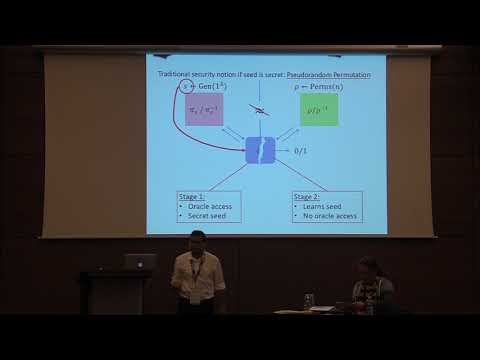Welcome to the resource topic for 2017/539
Title:
Public-Seed Pseudorandom Permutations
Authors: Pratik Soni, Stefano Tessaro
Abstract:A number of cryptographic schemes are built from (keyless) permutations, which are either designed in an ad-hoc fashion or are obtained by fixing the key in a block cipher. Security proofs for these schemes, however, idealize this permutation, i.e., making it random and accessible, as an oracle, to all parties. Finding plausible concrete assumptions on such permutations that guarantee security of the resulting schemes has remained an elusive open question. This paper initiates the study of standard-model assumptions on permutations – or more precisely, on families of permutations indexed by a {\em public} seed. We introduce the notion of a {\em public-seed pseudorandom permutation} (psPRP), which is inspired by the UCE notion by Bellare, Hoang, and Keelveedhi (CRYPTO '13). It considers a two-stage security game, where only the second stage learns the seed, and the first-stage adversary, known as the source, is restricted to prevent trivial attacks – the security notion is consequently parameterized by the class of allowable sources. To this end, we define in particular unpredictable and reset-secure sources analogous to similar notions for UCEs. We first study the relationship between psPRPs and UCEs. To start with, we provide efficient constructions of UCEs from psPRPs for both reset-secure and unpredictable sources, thus showing that most applications of the UCE framework admit instantiations from psPRPs. We also show a converse of this statement, namely that the five-round Feistel construction yields a psPRP for reset-secure sources when the round function is built from UCEs for reset-secure sources, hence making psPRP and UCE equivalent notions for such sources. In addition to studying such reductions, we suggest generic instantiations of psPRPs from both block ciphers and (keyless) permutations, and analyze them in ideal models. Also, as an application of our notions, we show that a simple modification of a recent highly-efficient garbling scheme by Bellare et al. (S&P '13) is secure under our psPRP assumption.
ePrint: https://eprint.iacr.org/2017/539
Talk: https://www.youtube.com/watch?v=MRnABCahfZs
See all topics related to this paper.
Feel free to post resources that are related to this paper below.
Example resources include: implementations, explanation materials, talks, slides, links to previous discussions on other websites.
For more information, see the rules for Resource Topics .
